|
|
|
Sort Order |
|
|
|
Items / Page
|
|
|
|
|
|
|
| Srl | Item |
| 1 |
ID:
149440
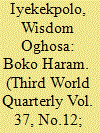

|
|
|
|
|
| Summary/Abstract |
Boko Haram insurgency has caused the death and displacement of thousands of Nigerians. Its means of terror has evolved from the use of crude weapons to bombs, kidnappings and the use of children as suicide bombers. Its reach has expanded beyond Nigeria into neighbouring West African countries and it has pledged allegiance to Al-Qaida and Islamic State. To address this security concern, its cause should first be ascertained. This paper argues that to do this, Boko Haram should be located in northern Nigerian historical context/environment. This paper reviews economic greed and grievance, extreme religious ideology and political opportunity in historic insurgencies in northern Nigeria. It finds that while the interplay of different factors shaped these insurgencies; it was political opportunity that ignited their onsets. Finally, the article submits that as long as these factors remain the same, military quelling of Boko Haram will not prevent a re-emergence of its likes.
|
|
|
|
|
|
|
|
|
|
|
|
|
|
|
|
| 2 |
ID:
149442
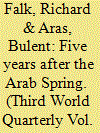

|
|
|
|
|
| Summary/Abstract |
A new political geography has emerged in the Middle East and North Africa (MENA) after the Arab Spring. The transformative impact of the popular upheavals appeared to put an end to long-term authoritarian regimes. Today, the region is far from stable since authoritarian resilience violently pushed back popular demands for good governance and is pushing to restore former state structures. However, the collective consciousness of the popular revolts endures, and a transformative prospect may emerge on the horizon. The chaotic situation is the result of an ongoing struggle between those who seek change and transformation and others in favour of the status quo ante. A critical evaluation of the Arab Spring after five years indicates a continuous process of recalculation and recalibration of policies and strategies. There are alternative routes for an eventual settlement in the MENA region, which are in competition against both regional and transregional quests for a favourable order.
|
|
|
|
|
|
|
|
|
|
|
|
|
|
|
|
| 3 |
ID:
149441
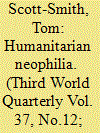

|
|
|
|
|
| Summary/Abstract |
This paper critically examines the ‘humanitarian innovation’ movement, arguing that it represents a departure from classical principles and the entry of a distinctive new ideology into the sector. Labelling this ‘humanitarian neophilia’, the paper argues that it has resonances of Barbrook and Cameron’s ‘Californian Ideology’, with its merging of New Left and New Right within the environs of Silicon Valley. Humanitarian neophilia, similarly, comes from a diverse ideological heritage, combining an optimistic faith in the possibilities of technology with a commitment to the power of markets. It both ‘understates the state’ and ‘overstates the object’, promoting a vision of self-reliant subjects rather than strong nation-states realising substantive socioeconomic rights.
|
|
|
|
|
|
|
|
|
|
|
|
|
|
|
|
| 4 |
ID:
149445
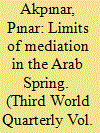

|
|
|
|
|
| Summary/Abstract |
This article investigates the limits of mediation during the Arab Spring by focusing on the case of Syria. It examines international mediation attempts by states, non-governmental organisation, and regional and international organisations. Drawing largely on Bercovitch and Gartner’s framework of mediation outcomes, the study suggests that the directive strategy applied by Staffan de Mistura through the United Nations–Arab League joint effort has achieved the closest outcome towards a full settlement. Mediation in the Syrian crisis has been limited by disagreement among key actors, lack of commitment and of coordinated efforts, questions of representation and legitimacy, and lack of neutrality and of inclusiveness. Despite its limits, mediation has been able to achieve important gains such as the longest and broadest ceasefire, access to the majority of besieged areas, considerable de-escalation of violence, commitment among key actors towards a resolution, and resolution of incidents of hostage crises. Despite its limits, mediation is likely to play an important role vis-à-vis the Arab Spring.
|
|
|
|
|
|
|
|
|
|
|
|
|
|
|
|
| 5 |
ID:
149446
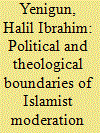

|
|
|
|
|
| Summary/Abstract |
This paper explores the repercussions of the apparent failure of Islamist experimentations with democracy during the Arab Spring in terms of the moderation hypotheses with a specific focus on the Egyptian case. I build on the existing arguments that repression may paradoxically moderate mainstream Islamist movements with certain caveats: when Islamists eventually come to power, their ideological vision also matters within the nexus of their strategic commitments and the on-going power struggles with other Islamist contenders. The prospects of democratisation, then, may also depend on the theoretical and political success of an Islamist political theology that accords better with rights and freedoms than a simplistic procedural democracy. Repression may indeed lead to moderation of the well-entrenched mainstream Islamist groups. However, such analyses focus only on those who remain within the fold of the mother organisation, rather than the splinter groups that break away with their more radicalised views. Under the post-Arab Spring conditions and given the Salafi factor, current views on the repression–moderation cycle must also account for the defection among certain Islamist constituencies towards jihadi or vigilante Salafism.
|
|
|
|
|
|
|
|
|
|
|
|
|
|
|
|
| 6 |
ID:
149436
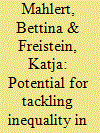

|
|
|
|
|
| Summary/Abstract |
The recently passed Sustainable Development Goals (SDGs) encompass a variety of explicit and implicit goals that address inequality. Although formulations remain vague and targets abstract, the SDGs go much further than previous development goals in addressing inequality as a central issue. Against the background of insights from inequality research, the article assesses their potential to become discursive resources for fundamental reforms of established development ideas.
|
|
|
|
|
|
|
|
|
|
|
|
|
|
|
|
| 7 |
ID:
149447


|
|
|
|
|
| Summary/Abstract |
This article evaluates the aftermath of the Arab Spring through the dual optic of a regional phenomenon and a series of country narratives. These narratives are categorised by reference first to the secular states that found a path to stability after experiencing strong uprisings that drove rulers from power, second to the states in which the uprisings generated prolonged resistance and continuing acute instability, and third to the monarchies that neutralised the uprisings at their inception and restored stability. When other dimensions of conflict are taken into account, it seems likely that the Middle East will continue to experience chaos, intervention and counterrevolution for years to come, and possibly even a second cycle of uprisings directed at the evolving order.
|
|
|
|
|
|
|
|
|
|
|
|
|
|
|
|
| 8 |
ID:
149443


|
|
|
|
|
| Summary/Abstract |
State failure, sovereignty disputes, non-state territorial structures, and revolutionary and counter-revolutionary currents, among others, are intertwined within the Arab Spring process, compelling old and emerging regional actors to operate in the absence of a regional order. The emergent geopolitical picture introduces the poisonous mix of loss of state authority spiralling toward instability, defined by sectarianism, extremism, global rivalries, and ultimately irredentism within interdependent subregional formations. This assertion is substantiated by detailed and specific evidence from the shifting and multi-layered alliance formation practices of intra- and inter-state relations, and non-state and state actors. Analysis of the relations and alliances through a dichotomous flow from domestic to regional and regional to global also sheds light on prospective future order. A possible future order may take shape around a new imagination of the MENA, with porous delimitations in the form of emerging subregions.
|
|
|
|
|
|
|
|
|
|
|
|
|
|
|
|
| 9 |
ID:
149444
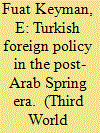

|
|
|
|
|
| Summary/Abstract |
Our globalising world is presently in a state of global turmoil. Risk, uncertainty, and insecurity are the terms that shape global/regional/national/local affairs and developments. The refugee crisis and the war against ISIL constitute the twin crises creating seismic impacts and consequences that in turn escalate risk and turmoil. Turkey is situated at the heart of these two crises, being very much affected by them and, therefore, perceived as a pivotal actor in the way in which the West is dealing with them. Yet, the West’s current instrumentalist and functionalist approach to Turkey as a buffer state designed to contain these two crises in the MENA does not offer an effective and sustainable solution to these crises, much less provide the stability and order that is direly needed in regional and global affairs.
|
|
|
|
|
|
|
|
|
|
|
|
|
|
|
|
| 10 |
ID:
149438
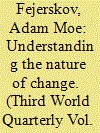

|
|
|
|
|
| Summary/Abstract |
This article argues that core lines of sociological institutionalist thought provide a set of valuable conceptual and theoretical vocabularies for exploring and explaining contemporary concerns of development cooperation. It identifies four broad categories of issues of central attention in the current study of development cooperation, and couples these with four avenues of sociological institutional research that may provide us with theoretical and conceptual frameworks for further empirically exploring and theoretically extrapolating these. Increasing attention to these theoretical concerns not only helps us progress the study of development cooperation, it may also allow us to inform contemporary institutional thinking.
|
|
|
|
|
|
|
|
|
|
|
|
|
|
|
|
| 11 |
ID:
149439


|
|
|
|
|
| Summary/Abstract |
This article analyses the impact of European Union (EU) policies in the field of fisheries on development in Africa. It contests the premise that the EU promotes local economies, and argues that it often contributes to depleting fish stocks, distorting African economic policies and harming fishers’ communities. In so doing, the EU is violating its basic duty to avoid harm to other states. However, it is now committed to sustainable development. This article offers suggestions on policies which would enable the EU to take on both its negative and positive duties.
|
|
|
|
|
|
|
|
|
|
|
|
|
|
|
|
| 12 |
ID:
149437
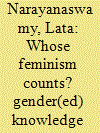

|
|
|
|
|
| Summary/Abstract |
Gender and development (GAD) has become a transnational discourse and has, as a result, generated its own elite elements. This elitism has tended to be attributed to a Northern hegemony in how feminism has been articulated and then subsequently professionalised and bureaucratised. What has received less attention, and what this paper highlights empirically, is how Southern-based feminisms might themselves be sites of discursive exclusion. The paper interrogates these concerns through an analysis of how professionalisation is evidenced in feminist engagement among civil society organisations working on gender in New Delhi. The analysis suggests that efforts to create spaces for subaltern voices are constrained not only by the disciplining effects of neoliberal frameworks but also – and in tandem – by Southern elite feminist priorities. The implications of these findings are significant: processes of professionalisation and the elitism they engender may have the effect of potentially precluding the engagement of those people on the margins whose voices are so sought after as part of efforts to facilitate inclusive development.
|
|
|
|
|
|
|
|
|
|
|
|
|
|
|
|
|
|
|
|
|